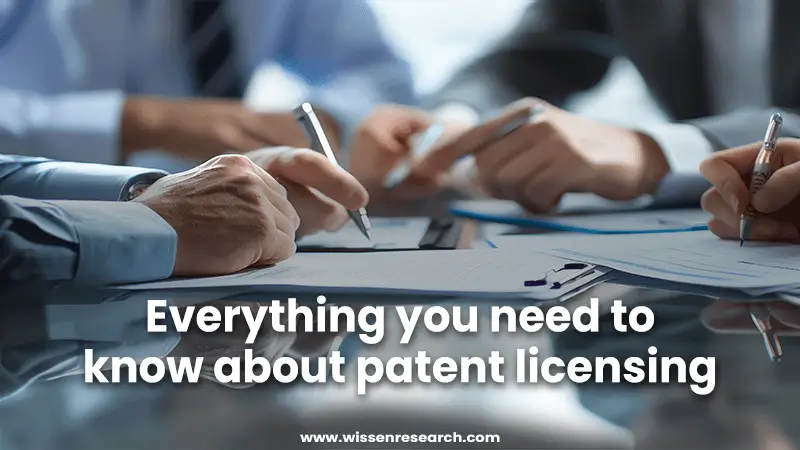
Close


Patent licensing is an agreement conducted between the owner of the patent and a third party (licensee) to use, sell and gain profits from a patented invention.
This happens when a patent owner transfers rights to a licensee over an agreed period of time.
Wissen Research is a renowned company that has professional experts in making broad researches on how you can go for any type of Patent licensing. To understand how patent licensing works, let us read the full article which is need to know about patent licensing.
An exclusive license is issued when a patent holder decides to be left with only a title and transfers ownership to a licensee. There are several reasons why a patent holder can grant rights to a licensee.
One of the reasons can be problems associated with money.
For example, a person gets a patent over a particular product but does not have money to produce and sell it. The Patent owner is free to give exclusive rights to someone else who is capable of producing and selling the product. Here the licensee will have the authority over all the rights but the title will remain with the owner. The only thing that the licensee cannot do is to further the licence to anybody else.
Exclusive licensing is important because it safeguards the originality of the invention and maintains a monopoly market.
Non-exclusive licensing is different from Exclusive licensing. This scenario happens when a Patent owner grants permission to more than one party. The licensees have the right to sell, use and design the product patented since the holder has already exploited it.
For example, a patent owner has a patented unique product, the patent holder is free to grant the rights to more than one company to use the same product. Non-exclusive is important because the licensor still has the right to exploit the invention.
Sub-licence is when the licensee grants permission to the organisation to produce the product invented.
In this case, the licensor is the one responsible for permitting the licensee to grant exclusive rights to the third party that wants to use the patented invention.
Cross licensing is a public or private agreement in which two or more parties have the right to a product. Some products need the support of each other to make profits in the market and that is why individuals or companies exchange rights to have further technological progress on their product/ invention.
Cross licensing can be for one or more patents and it is also royalty-free in terms of producing, using and selling.
When a government grants permission to an individual or a company to produce or process a patented product/ invention to the public without the consent of the patent owner is called compulsory licensing.
This type of licensing is usually done in pharmaceutical industries and it is open to everyone. It might be someone who is interested or someone who is already holding the license under the Patent.
If compulsory licensing is issued, there must be valid reasons for doing that and the patent holder must surely receive adequate remuneration
If you need to know about patent licensing support . Wissen Research is ready to provide, just visit our website wissenresearch.com or call us @ 1 (510) 240-9853
Please Subscribe our news letter and get update.
© Copyright 2023 – Wissen Research All Rights Reserved.
Powered by VintageCoders